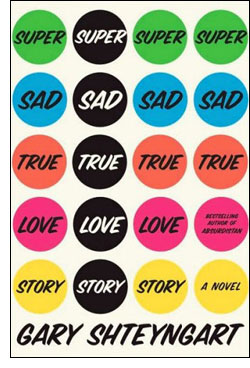 |
 |
 Gary Shteyngart
Gary Shteyngart
Super Sad True Love Story
Reviewed by: Rick Kleffel © 2010
Doubleday / Random House
USA Trade Hardcover, First Edition
ISBN 978-1-400-06640-7
Publication Date: 07-27-2010
360 pages, $ 26
Date Reviewed: 08-16-2010
Index:
Science Fiction
General Fiction
Humor and pain are well known to consist of the same ingredients. Mix up one, and you're laughing; the other and you're crying. Sometimes it is very difficult to tell the difference, if there is a difference. The pain of life can only be met, it seems, with humor. And as the pace of life increases, as the pace of change increases, so to does the fluctuation rate of the humor/pain quantum existence.
Gary Shteyngart is a man who is quite well tuned to this frequency. It is as if it is his own private radio station, broadcasting a program only he can hear. But once he's heard it, he's able to write the novel that is unfolding with a command of language that makes for an unforgettable reading experience.
Shteyngart has been dipping into Raymond Kurzweil, among other non-fiction reading, and he tunes into the future in 'Super Sad True Love Story' (Random House ; July 27, 2010 ; $26). Channeling Lenny Abramov, Shteyngart creates a novel that is painfully hilarious with language that seems destined to dribble from our televisions tomorrow. From the moment we are introduced to Lenny by Lenny, in his diary — such a quaint term! — we get the feeling that the future in which Lenny finds himself is no more than our present, even as he describes pieces and people in a manner that seems prescient.
'Super Sad True Love Story' is drenched in imaginary fashions and projected technologies, but it's not about them. It's about us. This future is wrapped in the present. Many of the predictions have already come to pass. We're looking at what seems like a new sort of novel, but it has ample precedent. Not surprisingly, our literary experience of the novel itself is a demonstration of what the novel itself does. 'Super Sad True Love Story' is a prefect example of retro-prescience.
Of course, once you open the book and start reading, you're going to forget all the categories and get caught up, as is proper, in the story, which is aptly summed up in the title. Lenny Abramov is a dorky, aging and apparently talentless guy who indeed has a great gift for language on offer to a world that does not want to listen. When he meets and falls in love with much-younger Eunice Park, he finds himself forced to engage with a reality that seems to be sprinting away from him. There are complications that involve his employer, and the utter and complete destruction of not just the American economy, but also the idea-as-ideal.
Shteyngart's prose voice in this novel is an endlessly entertaining high-wire act. He smartly splits the novel into two soliloquies; half the book consists of his diaries, and the other half, Eunice's "GlobalTeens" account. Of course, Lenny's prose is peerless, but as well, Eunice's passages shine and demand to be read aloud, preferably by the snobbiest twenty-something woman you know.
Shteyngart has perhaps too much fun with his neologistic frenzy, spinning off new words and acronyms so fast that many readers won't be able to keep track of them, which might be more of a problem if they didn't just whip by faster than a speeding one-hit pop star.
For all the futuristic foofaraw, 'Super Sad True Love Story' is a pretty simple, character-driven romantic comedy. The characters are superbly drawn, including the large but easily-tracked supporting cast of friends and family. Shteyngart isn't afraid to steer things into darker, sterner territory when the story calls for it, but is able to avoid ickiness in favor of bracing honesty. There's a measure of redemption and a measure (or two) of randomly-directed unhappiness. If something threatens not to work it whips by before it outlives its unwelcome.
'Super Sad True Love Story' uses the tropes of genre fiction well, but is crafty enough to gather an audience well beyond genre readers -- though they should enjoy the novel as well. Here's a novel born in the past, but not bored with it, that manages to have fun in the future without getting stuck there. This is retro-prescience at its finest, a cream pie in the face of a tomorrow that we trust will fall flat on its face. The best part is that when it does, we can all laugh, as we leave behind the past, sneak through the present and stumble into the future.
|
 |
|
|
 |
| |
Review Archive
All Reviews alphabetized by author.
General Fiction
Non-Genre, general fiction and literature.
Horror
Supernatural fiction, supernatural horror and non-supernatural horror.
Science Fiction
Science fiction, science fantasy, speculative fiction, alternate history.
Fantasy
Fantasy, surrealism and magic realism.
Mystery
Crime, thrillers, mystery, suspense.
Non-Fiction
Non-Fiction, True Crime, Forteana, Reference.
Poetry
|
|
 |
|




